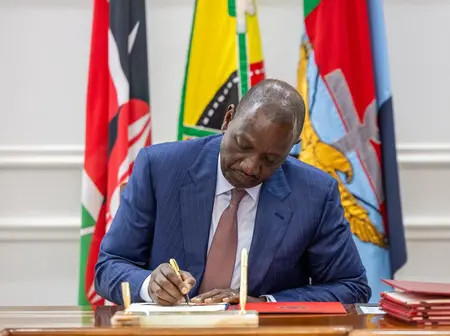Since taking office in September 2022, President William Ruto’s Kenya Kwanza administration has moved swiftly to fill many positions across government ministries, state corporations, and diplomatic missions.
However, a recurring and notable trend has emerged: a series of high-profile and skilled individuals have publicly declined, rejected, or quietly failed to accept prestigious appointments.
These rejections, spanning from cabinet-level offers to critical parastatal leadership roles, have at times caused administrative delays and drawn public scrutiny.
2025-08-12T05:55:21+00:00
2025-08-12T08:03:47+00:00
While the reasons cited vary from personal commitments to a lack of prior consultation, the pattern highlights a significant challenge for the government.
A particularly striking example of high-profile rejections occurred with the post of Kenya’s High Commissioner to Ghana, which was turned down by two separate nominees in less than a year.
In a letter to Parliament just before his scheduled vetting, Kemosi stated that compelling family matters prevented him from taking up the diplomatic posting.
Months later, the challenge of filling the role re-emerged. In January 2025, a second nominee, Margaret Nyambura Ndung’u, also declined the appointment.
Similar to her predecessor, she cited personal and family reasons for her decision.
In August 2025, she landed a job at the United Nations in the Digital Public Infrastructure (DPI) Safeguards Strategic Advisory Board.
Her refusal was not based on personal reasons but on fundamental constitutional principles.
Ms Odhiambo argued that the creation and mandate of the task force were unconstitutional, as they usurped the powers and duties exclusively given to the Office of the Auditor-General.
In her public refusal, she stated that the LSK could not participate in a body whose very existence, in its view, undermined a critical and independent constitutional office
Citing personal reasons, Ms. Wamae explained that her primary reason for turning down the role was that she was on maternity leave.
On October 7, 2024, Dr. Munyaka revealed he was turning down the position, citing the current political climate as a key factor in his decision.
A surprising element of his rejection was the claim that he had not been consulted prior to the appointment and had only learned about his new role after it was officially published in the Kenya Gazette.
This lack of direct communication, combined with his assessment of the political environment at the time, led him to formally refuse the government post.
The announcement was made on October 26, 2024, primarily through a public post on her social media platform, X (formerly Twitter.
In her statement, Ms. Omanga cited unspecified “personal reasons” for her inability to take up the role on the presidentially-appointed commission.
Ndemo raised legal and procedural concerns, particularly around whether the Education Cabinet Secretary had formally concurred with the University Council’s decision, a mandatory requirement under Kenyan law.
)
In a statement, he described the process as “unprocedural” and consequently dissociated himself from the appointment
The pattern of appointment rejections continued late in the year when Hussein Tene Debasso, the Member of Parliament for Isiolo South, turned down a position on the Council of the National Youth Service (NYS).
On November 19, 2024, it was reported that the legislator had formally declined the appointment.
)
Rather than a social media announcement, Mr. Debasso communicated his decision directly to the executive by writing a letter to the President.
In his correspondence, he cited personal reasons as his basis for being unable to take on the duties of an NYS Council member, making him another public official to refuse a state-appointed role during that period.
Before this, he has earlier been sacked from the Kenya National Trading Corporation
The trend continued into the new year when veteran politician Timothy Bosire publicly rejected his appointment as the non-executive Chairperson of the National Transport and Safety Authority (NTSA) Board on January 18, 2025.
Mr. Bosire, who serves as the National Treasurer for the Orange Democratic Movement (ODM) party, cited two primary reasons for turning down the high-profile role.
First, he stated that he had not been consulted prior to the announcement, learning of it only after its publication.
)
Second, he expressed concern that accepting the position could be perceived as undermining the interests of his community and his political standing, especially given the prevailing political environment.
In the most recent development in this trend, Duncan Oburu Ojwang on August 13, 2025, withdrew his nomination to become the next Chairperson of the Kenya National Commission on Human Rights (KNCHR).
The news was formally communicated by the Speaker of the National Assembly Moses Wetangula during the morning session.
According to the communication, Dr. Ojwang declined the pivotal nomination for two main reasons; unspecified personal reasons and a perceived conflict of interes which he believed would compromise his ability to lead the independent rights body effectively.
His withdrawal from consideration for the head of a critical constitutional commission at the vetting stage forces the selection process to begin anew and marks the latest instance of a prominent nominee turning down a key government post.
)
The instances of declined appointments, while not numerous enough to constitute a crisis, point to potential gaps in the nomination pipeline.

Leave a Reply